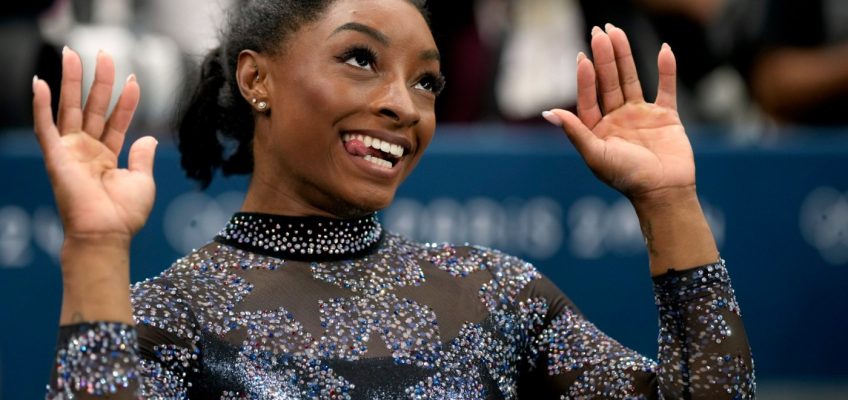PARIS — On the first sunny day of the Paris Olympics, the stars from the United States shined bright.
Simone Biles and LeBron James dazzled, so did the U.S. women’s soccer team. Torri Huske grabbed some of the spotlight, and Haley Batten made a name for herself by earning a silver medal in mountain biking for the best finish ever by an American rider.
Although it was French swimmer Léon Marchand who received the most boisterous cheers in crushing the field to win gold in the men’s 400-meter individual medley, the U.S. had a strong Sunday on Day 2 of the Games.
Simone shines
Biles made her Olympic return three years after pulling out of multiple finals at the Tokyo Games to protect her safety, which prompted an international discussion about mental health, by powering through discomfort she felt in her calf to lead the U.S. women’s gymnastics team into the finals.
Biles, Suni Lee and Jordan Chiles went 1-2-3 in the all-around during early qualifying, though Chiles will miss the all-around final due to rules that limit countries to entering two athletes per competition.
There’s a chance Chiles will make the floor exercise final should she finish in the top eight. Lee is practically a lock for the beam and bars finals, with 2020 floor exercise champion Jade Carey in good position to join Biles in the vault final.
But all eyes were on Biles, who briefly scared an entire nation when she left the after her floor exercise and received medical attention. She had tweaked her calf in warm-up, but U.S. coach Cecile Landi said it was a minor injury.
She performed in front of a star-studded crowd that included Tom Cruise, Jessica Chastain, Snoop Dogg, Anna Wintour and Lady Gaga, who wrote on social media of Biles: “She nailed it, what an honor to be so close!”
LeBron James leads Team USA
Two of the most experienced Olympians on the U.S. men’s basketball team, James and Kevin Durant, began the squad’s bid for a fifth consecutive gold medal with a near-flawless performance.
LeBron James, left, of the United States, shoots as Bogdan Bogdanovic, of Serbia, during a men’s basketball game at the 2024 Summer Olympics, Sunday, July 28, 2024, in Villeneuve-d’Ascq, France. (Gregory Shamus/Pool Photo via AP)
Durant made his first eight shots and scored 23 points, James added 21 points, nine assists and seven rebounds and the U.S. rolled to a 110-84 win over Serbia in the Olympic opener for both teams.
James and Durant were a combined 18 for 22 from the field — 8 of 9 for Durant, 9 of 13 for James — as the U.S. had no trouble with the reigning World Cup silver medalists.
Jrue Holiday scored 15, Devin Booker had 12 and Anthony Edwards and Stephen Curry each added 11 for the U.S.
Pool party
Huske knocked off world-record holder Gretchen Walsh in the women’s 100 butterfly, using a strong finish to get her hands to the wall just ahead of her teammate in a 1-2 finish for the U.S.
The favorite went out with her usual strategy: start fast and try to hold on. It worked at the U.S. trials, where she set her world record of 55.18 last month, and she was under record pace at the turn.
Related Articles
When does St. Paul gymnast Suni Lee compete at the 2024 Summer Olympics in Paris?
What to watch at the Paris Olympics on Sunday, July 28
Paris Olympics: Here’s what’s on TV on Sunday
Olympics: St. Paul gymnast Suni Lee comes up clutch, secures her spot in all-around final
Jace Frederick: What if, just for these Olympics, Anthony Edwards looked more like Jrue Holiday than LeBron James?
But Huske chased her down in the race that really mattered. The winner touched in 55.59 — about the length of a finger ahead of Walsh’s time of 55.63.
When Huske saw the “1” beside her name on the scoreboard, she reached across the lane rope to give Walsh and hug while breaking down in tears.
Marchand, meanwhile, lived up to the huge expectations at his home Olympics with a flag-waving crowd cheering his every stroke. He was under world-record pace on the final turn but faded a bit coming home, touching in 4 minutes, 2.95 seconds — an Olympic record, but just shy of his own world mark of 4:02.50.
Marchand claimed that mark at last year’s world championships in Fukuoka, Japan, erasing a record held by Michael Phelps for 15 years.
And, in an upset, Italian swimmer Nicolo Martinenghi shocked record-holder Adam Peaty in the 100 breaststroke.
Peaty, the gold medalist in both Rio de Janeiro and Tokyo, had taken a long layoff to deal with mental health issues. Upon his return, he worked his way back up to speed and entered the final as the top qualifier but settled for silver as his quest for a third consecutive gold was ended.
US Soccer wins
Sophia Smith scored a pair of goals to lead the U.S. past Germany 4-1 and put the team in good position to advance out of its group at the Olympics.
Mallory Swanson and Lynn Williams also scored for the Americans, who defeated Zambia 3-0 in the opener but won’t know their fate in the knockout round for sure until after the final Group B matches on Wednesday.
The Americans play Australia in Marseille to conclude group play.
Mountain biker medals
Batten broke a rule but still came home with America’s best ever mountain biking finish when she won silver.
Batten was fined by the Olympic mountain bike judges for violating a rule on the final lap of her race. She was jockeying for second place when she went through a lane dedicated for taking on food and drink or stopping for mechanical problems.
Pauline Ferrand Prevot, of France, centre, winner of the women’s mountain bike cycling event, poses with her gold medal flanked by silver medallist Haley Batten, of United States, left, and bronze medallist Jenny Rissveds, of Sweden, at the 2024 Summer Olympics, Sunday, July 28, 2024, in Elancourt, France. (AP Photo/George Walker IV)
After the judges reviewed the footage, they decided Batten had done neither and broke one of the rules of the race. She was fined 500 Swiss francs, or about $565, for “failure to respect the instructions of the race organization or commissaires,” though the judges apparently decided that the infraction was not serious enough to warrant a disqualification.
Batten finished ninth three years ago at the Tokyo Games.
Tennis veterans win
Rafael Nadal was unsure he could even play men’s singles Sunday the day before his match, but turned up at Roland Garros and beat Marton Fucsovics of Hungary 6-1, 4-6, 6-4 in the first round.
The victory set up a blockbuster showdown against rival Novak Djokovic.
It will be the 60th meeting between this pair of greats, more than any other two men have played against each other in the sport’s Open era, which began in 1968. Djokovic, a 37-year-old from Serbia, leads the head-to-head series 30-29, and his 24 Grand Slam titles make him the only man in tennis history with more than Nadal’s 22.
Andy Murray’s tennis career, meanwhile, was extended for at least one more match when he and British partner Dan Evans saved five match points during a first-round doubles win. Murray and Evans rallied past the Japanese pair of Taro Daniel and Kei Nishikori 2-6, 7-6 (5), 11-9.
The Brits trailed 9-4 in the decisive tiebreaker, which is held in place of a third set in doubles.
The 37-year-old Murray announced before the Summer Games that it would be the final event of his career, and then pulled out of the singles bracket, leaving him only in doubles.
Murray is a three-time Grand Slam champion and the only tennis player with two Olympic singles golds — from London in 2012 and Rio de Janeiro in 2016.
Related Articles
When does St. Paul gymnast Suni Lee compete at the 2024 Summer Olympics in Paris?
What to watch at the Paris Olympics on Sunday, July 28
Paris Olympics: Here’s what’s on TV on Sunday
Olympics: St. Paul gymnast Suni Lee comes up clutch, secures her spot in all-around final
Jace Frederick: What if, just for these Olympics, Anthony Edwards looked more like Jrue Holiday than LeBron James?




